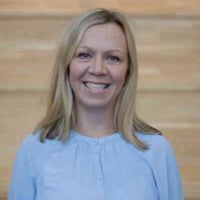Louise Hayes
Now a senior university lecturer, Louise began her computing career navigating MS-DOS with the keyboard function keys, in the days before Windows or the mouse.
 Tell us a bit about yourself
Tell us a bit about yourself
My first job after my A levels was a telephone operator with BT plc where I was trained on a Strowger telephone exchange. Following a family relocation to the Northwest I moved into another BT role in a commercial support office where I was expected to work on a PC using Microsoft’s MS-DOS operating system. Thanks to my experience in the telecommunications industry using DBASE and Lotus 1-2-3, I was able to navigate my way through the system.
In the days before the mouse, keyboard skills and use of function keys added another level of ‘interest’. However it all came quite naturally to me, and I’ve maintained an interest in using program systems throughout my 30+ year career. When a promotion loomed requiring a degree, I embarked on my studies at Manchester Metropolitan University as a full-time employee and part-time student.
What motivated you to move into teaching?
I’ve always been driven by a wish to make a difference. I enjoyed staff training at BT and my role for a time was in the education sales sector of the organisation. Now I’m a senior university lecturer and often still support others in the work I do.
It was after my maternity leave, having worked for BT for 16 years, that I decided I wanted a change of focus and less travel to London. I began my PGCE in 2003. There I was, a full-time student for the first time, with two children under four. My move into secondary school teaching drew strong reactions from friends and family, not all of them positive! But I believed at the time, and now I know for sure, I‘d made the right decision.
Why computing?
I’ve always had an interest in computer, from the Atari and ZX Spectrum in my home in the 80s, to taking O level computer studies at school where I was introduced to BBC Basic programming. Subsequent job roles then introduced me to a lifelong love of databases, HTML and spreadsheets.
What is your proudest moment in teaching?
There are quite a few. In the classroom, I’d say it’s the little things, such as the unsolicited ‘thank-yous’ from pupils that always took you by surprise and were lovely to receive. Young people are great to be around and there are particular classes and pupils that stay in your memory. I still have a mouse mat on my desk signed with comments given to me by my first group of pupils who all successfully gained their GCSE.
Another great aspect of the role were the school educational visits and the opportunity to get involved outside of the classroom in various activities and locations. More recently, I visited Malawi and India where I was involved in the delivery of computing lessons and teacher training. I’m sure my young self would never have seen this happening!
Also the long established network I’ve built up of supportive and amazing teaching colleagues. The staff room is something that I miss today.
Any advice for someone thinking about a career in teaching?
It’s important you look at all the options open to you and think about the type of school you want to train and work in. Also remember that you’re training for a profession which offers many exciting career paths within it. There are online events that can support your research and excellent free resources available to help you understand what’s involved in teaching, such as the courses on Futurelearn.
You might consider volunteering to help at a coding club, or get in touch with a local school to see if you can volunteer in their department. This will give you experience working with pupils which certainly helps when you start in school. The ethos of networking and supporting each other in computing education is really valued through volunteer programmes such as CAS which offers a supportive community for computing teachers.













